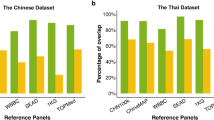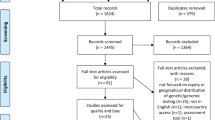Abstract
Equitable implementation of genomic medicine requires understanding preferences of diverse populations. Stated preference methods, such as discrete choice experiments (DCEs) and conjoint analyses, allow empirical evaluation of whether and how preferences for aspects of genomic medicine tests and services differ according to demographic characteristics. We aimed to understand the extent to which stated preference research in genomic medicine includes respondents that are population representative and evidence regarding preference heterogeneity by race and ethnicity. We conducted a systematic review of the stated preference literature in genomic medicine. We searched Web of Science, CINAHL, PsycINFO, PubMed, Embase, Cochrane Library, and SCOPUS for articles published from February 2021 to November 2023, extending a previously published systematic review. We extracted information on whether demographic characteristics of respondents were reported, whether investigators tested for preference heterogeneity based on race and ethnicity, and whether preference heterogeneity by race and ethnicity was identified. We identified 138 newly published records in addition to the 38 articles included in the original review. In total, we included 18 articles that reported participants’ race or ethnicity. Eight articles explicitly analyzed preferences by race and ethnicity, and preference heterogeneity was identified in two. Stated preference research in genomic medicine often does not include population representative samples, and preference heterogeneity is not frequently analyzed according to race and ethnicity. Improving the representativeness of respondent populations, which allows for better understanding of whether and how preferences may differ by population subgroups, is important to guide policy and implementation decisions in genomic medicine.
This is a preview of subscription content, access via your institution
Access options
Subscribe to this journal
Receive 12 print issues and online access
$259.00 per year
only $21.58 per issue
Buy this article
- Purchase on SpringerLink
- Instant access to the full article PDF.
USD 39.95
Prices may be subject to local taxes which are calculated during checkout

Similar content being viewed by others
Data availability
Search queries are available in the Supplementary Material. Further enquiries can be directed to the corresponding author.
References
Christensen KD, Zhang M, Galbraith LN, Granot-Hershkovitz E, Nelson SC, Gonzalez S, et al. Awareness and utilization of genetic testing among Hispanic and Latino adults living in the US: The Hispanic Community Health Study/Study of Latinos. HGGADVANCE. 2023;4. Available from: https://www.cell.com/hgg-advances/abstract/S2666-2477(22)00077-X.
Hann KEJ, Freeman M, Fraser L, Waller J, Sanderson SC, Rahman B, et al. Awareness, knowledge, perceptions, and attitudes towards genetic testing for cancer risk among ethnic minority groups: a systematic review. BMC Public Health. 2017;17:503.
Tiner JC, Mechanic LE, Gallicchio L, Gillanders EM, Helzlsouer KJ. Awareness and use of genetic testing: An analysis of the Health Information National Trends Survey 2020. Genet Med. 2022;24:2526–34.
Garrison NA, Hudson M, Ballantyne LL, Garba I, Martinez A, Taualii M, et al. Genomic research through an indigenous lens: understanding the expectations. Annu Rev Genomics Hum Genet. 2019;20:495–517.
Fatumo S, Chikowore T, Choudhury A, Ayub M, Martin AR, Kuchenbäcker K. Diversity in Genomic Studies: A Roadmap to Address the Imbalance. Nat Med. 2022;28:243–50.
Ryan M, Bate A, Eastmond CJ, Ludbrook A. Use of discrete choice experiments to elicit preferences. Qual Health Care. 2001;10:i55–60.
Hauber AB, González JM, Groothuis-Oudshoorn CGM, Prior T, Marshall DA, Cunningham C, et al. Statistical Methods for the Analysis of Discrete Choice Experiments: A Report of the ISPOR Conjoint Analysis Good Research Practices Task Force. Value Health. 2016;19:300–15.
Ozdemir S, Lee JJ, Chaudhry I, Ocampo RRQ. A Systematic Review of Discrete Choice Experiments and Conjoint Analysis on Genetic Testing. Patient. 2022;15:39–54.
PICO Portal. New York, NY, United States; Available from: www.picoportal.org.
Armstrong K, Putt M, Halbert CH, Grande D, Schwartz JS, Liao K, et al. The influence of health care policies and health care system distrust on willingness to undergo genetic testing. Med Care. 2012;50:381–7.
Chen C, Roberts MH, Raisch DW, Thompson TA, Bachyrycz A, Borrego ME. Preferences for pharmacogenomic testing in polypharmacy patients: a discrete choice experiment. Per Med. 2022;19:535–48.
Davidson BA, Ehrisman J, Reed SD, Yang JC, Buchanan A, Havrilesky LJ. Preferences of women with epithelial ovarian cancer for aspects of genetic testing. Gynecol Oncol Res Pract. 2019;6:1.
Huang MY, Huston SA, Perri M. Consumer Preferences for the Predictive Genetic Test for Alzheimer Disease. J Genet Counseling. 2014;23:172–8.
Issa AM, Tufail W, Atehortua N, McKeever J. A national study of breast and colorectal cancer patients’ decision-making for novel personalized medicine genomic diagnostics. Personalized Med. 2013;10:245–56.
Kilambi V, Johnson FR, González JM, Mohamed AF. Valuations of Genetic Test Information for Treatable Conditions: The Case of Colorectal Cancer Screening. Value Health. 2014;17:838–45.
Knight SJ, Mohamed AF, Marshall DA, Ladabaum U, Phillips KA, Walsh JME. Value of Genetic Testing for Hereditary Colorectal Cancer in a Probability-Based US Online Sample. Med Decis Mak. 2015;35:734–44.
Lewis MA, Stine A, Paquin RS, Mansfield C, Wood D, Rini C, et al. Parental preferences toward genomic sequencing for non-medically actionable conditions in children: a discrete choice experiment. Genet Med. 2018;20:181–9.
Regier DA, Veenstra DL, Basu A, Carlson JJ. Demand for Precision Medicine: A Discrete-Choice Experiment and External Validation Study. PharmacoEconomics. 2020;38:57–68.
Marshall DA, Deal K, Bombard Y, Leighl N, MacDonald KV, Trudeau M. How do women trade-off benefits and risks in chemotherapy treatment decisions based on gene expression profiling for early-stage breast cancer? A discrete choice experiment. BMJ Open. 2016;6:e010981.
Mighton C, Clausen M, Sebastian A, Muir SM, Shickh S, Baxter NN, et al. Patient and public preferences for being recontacted with updated genomic results: a mixed methods study. Hum Genet. 2021;140:1695–708.
Powell G, Holmes EAF, Plumpton CO, Ring A, Baker GA, Jacoby A, et al. Pharmacogenetic testing prior to carbamazepine treatment of epilepsy: patients’ and physicians’ preferences for testing and service delivery. Br J Clin Pharm. 2015;80:1149–59.
Marshall DA, MacDonald KV, Heidenreich S, Hartley T, Bernier FP, Gillespie MK, et al. The value of diagnostic testing for parents of children with rare genetic diseases. Genet Med. 2019;21:2798–806.
Dong D, Ozdemir S, Mong Bee Y, Toh SA, Bilger M, Finkelstein E. Measuring High-Risk Patients’ Preferences for Pharmacogenetic Testing to Reduce Severe Adverse Drug Reaction: A Discrete Choice Experiment. Value Health. 2016;19:767–75.
Wong XY, Groothuis-Oudshoorn CG, Tan CS, van Til JA, Hartman M, Chong KJ, et al. Women’s preferences, willingness-to-pay, and predicted uptake for single-nucleotide polymorphism gene testing to guide personalized breast cancer screening strategies: a discrete choice experiment. Patient Prefer Adherence. 2018;12:1837–52.
Wee JW, Png WY, Wong XY, Kwan YH, Lin YY, Tan DSY, et al. Measuring preferences for CYP2C19 genotyping in patients with acute coronary syndrome – a discrete choice experiment. Future Cardiol. 2020;16:663–74.
Lysaght T, Ballantyne A, Toh HJ, Lau A, Ong S, Schaefer O, et al. Trust and Trade-Offs in Sharing Data for Precision Medicine: A National Survey of Singapore. JPM. 2021;11:921.
Hall J, Fiebig DG, King MT, Hossain I, Louviere JJ. What influences participation in genetic carrier testing? J Health Econ. 2006;25:520–37.
George S, Duran N, Norris K. A systematic review of barriers and facilitators to minority research participation among African Americans, Latinos, Asian Americans, and Pacific Islanders. Am J Public Health. 2014;104:e16–31.
Fisher ER, Pratt R, Esch R, Kocher M, Wilson K, Lee W, et al. The role of race and ethnicity in views toward and participation in genetic studies and precision medicine research in the United States: a systematic review of qualitative and quantitative studies. Mol Genet Genom Med. 2020;8:e1099.
Cho MK, Duque Lasio ML, Amarillo I, Mintz KT, Bennett RL, Brothers KB. Words matter: The language of difference in human genetics. Genet Med. 2023;25:100343.
Committee on the Use of Race, Ethnicity, and Ancestry as Population Descriptors in Genomics Research, Board on Health Sciences Policy, Committee on Population, Health and Medicine Division, Division of Behavioral and Social Sciences and Education, National Academies of Sciences, Engineering, and Medicine. Using Population Descriptors in Genetics and Genomics Research: A New Framework for an Evolving Field. Washington, D.C.: National Academies Press; 2023. Available from: https://www.nap.edu/catalog/26902.
Funding
This research is supported by a grant from the National Human Genome Research Institute (NHGRI), R00HG011491-03S1. Dr. Smith is supported by R00HG011491. The funder had no role in the design, data collection, data analysis, and reporting of this study.
Author information
Authors and Affiliations
Contributions
TM and HSS designed and conducted the systematic review, performed analysis, and contributed to the original version of the manuscript. MH served as a second reviewer for the systematic review. HSS supervised the findings of the systematic review. HSS and MH contributed to the critical review and revision of the manuscript.
Corresponding author
Ethics declarations
Competing interests
HSS has received consulting income from Illumina, Inc. unrelated to this work. The other authors have no conflicts of interest to declare.
Additional information
Publisher’s note Springer Nature remains neutral with regard to jurisdictional claims in published maps and institutional affiliations.
Supplementary information
Rights and permissions
Springer Nature or its licensor (e.g. a society or other partner) holds exclusive rights to this article under a publishing agreement with the author(s) or other rightsholder(s); author self-archiving of the accepted manuscript version of this article is solely governed by the terms of such publishing agreement and applicable law.
About this article
Cite this article
Montgomery, T., Hickingbotham, M.R. & Smith, H.S. Preferences for genetic testing among populations underrepresented in genomic research: a systematic review. Eur J Hum Genet 33, 814–818 (2025). https://doi.org/10.1038/s41431-025-01819-8
Received:
Revised:
Accepted:
Published:
Version of record:
Issue date:
DOI: https://doi.org/10.1038/s41431-025-01819-8
This article is cited by
-
What’s new in EJHG in May 2025?
European Journal of Human Genetics (2025)



